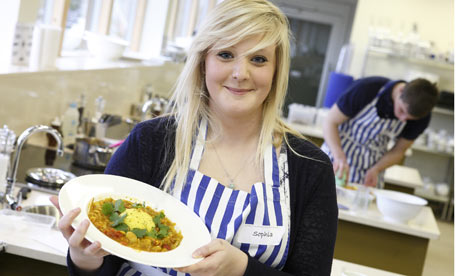
'Let's face it, when you're at uni you're not going to cook lemon rice with poppy seeds, are you?" says Sophia Tranter, 16. "You're just going to do rice". Her friend Katy Syvret, 17, muses: "It is nicer, though, with the lemon – a bit different," as she pops the lid on her saucepan to help the flavours infuse.
Katy and Sophia, both A-level pupils, are on a half-day student course at Eckington Manor Cookery School, in Worcestershire.
The idea is that they, together with three lads who admit they've been sent on the course by their mums, will learn how to knock up a few tasty dishes for when they pitch up at university, as well as giving them the confidence to try new things in the kitchen.
After lots of peeling, chopping and stirring under the watchful eye of chef Dean Cole, the five have just made carrot and coriander soup, peshwari naan and a chicken curry. Carrot cake is next up. Not bad for a couple of hours slaving over a hot stove (though we don't know what it tastes like yet).
Students undoubtedly have a reputation for committing terrible crimes against food. Tuna porridge is probably the most gruesome student concoction I've come across. But one guy I knew at uni who bought a bag of 99 value sausages for a couple of quid at the start of term, and chewed his way through them night after night, was a particularly miserable example of how not to eat.
"There's a moment of truth when they go away and suddenly realise that food doesn't just happen," laughs Fiona Beckett, award-winning food writer and author of the Beyond Baked Beans series of student cookbooks.
"One of the main barriers students tell me about is lack of time. Lots are doing part-time jobs as well as studying, so finding time to cook is hard."
Thinking ahead and working out what to eat each day is tricky too, especially as the student lifestyle isn't big on routine.
"The shopping is just as much a skill as the cooking, and making sense of the week ahead," says Beckett.
"My advice is don't go and do a big weekly shop, as things might get wasted, but buy for three days or so and keep an audit of what's in the fridge."
Despite having been a culinary arts management student, "finding time and energy to shop properly was the hardest thing", agrees Ben Ebrell, who has since co-founded student cookery website sortedstudents.com.
He observes, however, that "once out in the real world, with real bills to pay and a proper working week, this can only get tougher, so grasping the fundamentals of cooking on a budget with quick, simple, tasty meals that you won't get bored of and can knock up in minutes is crucial."
Learning to feed yourself well, he points out, is a life skill, just like learning to drive.
"Unlike learning to drive, it needn't be stressful, but good fun and something that can be done with mates.
"Oh, and it becomes a great pulling tool later on when you've got your own pad."
Teaming up with others can make a big difference to a tired and hungry student's motivation to cook, says Ebrell. "Sharing the shopping and cooking, and then eating together, transforms the 'chore' at the end of the day," he says. And by joining forces with fellow students, you also automatically get at least every other night off cooking duty, points out Beckett.
But that's the organisational side. What about the cost of eating well? When you've never had to buy food before, budgeting for every mouthful can be a daunting prospect. So what do our student cooks reckon they could feel themselves on?
"Five pounds a day?" ventures Sophia.
"I reckon I could do it on three," says Katy.
"Yeah, but I don't want to be eating endless Tesco value sausages with no meat in them," protests Sophia.
"I think a lot of people are living on less than £35 a week for food," says cookery writer Sam Stern, 19, author of Sam Stern's Student Cookbook, who is a first-year student at Edinburgh University. He points out though that by pooling resources you instantly have a far more serious weekly budget, can benefit from economies of scale, and can afford to invest in a range of store-cupboard ingredients that can give flavour to the simplest of dishes .
Back in the cookery school kitchen, every recipe being taught today is purposely easy to make and relies on cheap ingredients; the carrot, coriander and ginger soup, for example, could be knocked up for pennies by anyone who has the ability to chop and stir.
It turns out the lemon, turmeric and poppy seeds have transformed a boring pile of rice into a fragrant fluffy mound of deliciousness.
Though the five soon-to-be undergraduates are soon happily wolfing it down, I bet that once they get to uni, toast is a regular fixture on the menu.

